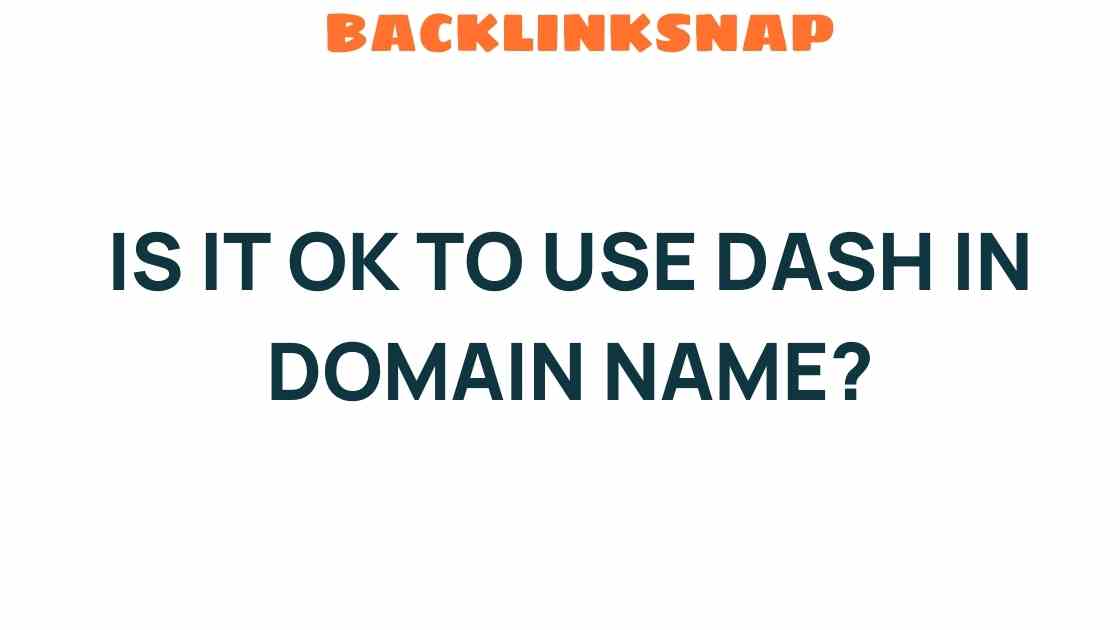Is It OK to Use Dash in Domain Names? Unpacking the Controversy
When it comes to establishing an online presence, choosing the right domain name is crucial. One debate that continues to spark discussions among webmasters and digital marketers is whether it’s acceptable to use dashes in URLs. This question isn’t just a matter of preference; it intertwines with aspects of SEO impact, website branding, and overall user experience. In this article, we’ll unpack the controversy surrounding dashes in domain names, providing insights into their effects on readability, keyword optimization, and more.
The Basics of Domain Names
A domain name serves as the address of your website, guiding users to your online portal. It’s a vital part of your brand’s identity, aiming to be memorable and reflective of your content or services. Typically, domain names consist of two parts: the second-level domain (the name itself) and the top-level domain (like .com, .org, etc.).
When contemplating the inclusion of dashes, the question arises: do they enhance or hinder a domain name’s effectiveness? Let’s dive deeper.
Understanding Dashes in URLs
Dashes, or hyphens, can be employed to separate words in a domain name. For example, “best-coffee-reviews.com” utilizes dashes to clarify the individual components of the name. This practice can improve readability but also poses potential drawbacks.
SEO Impact of Dashes in Domain Names
The search engine optimization (SEO) implications of using dashes have been debated extensively. Here are a few key points:
- Keyword Separation: Dashes can help search engines identify distinct keywords within a domain name. For instance, “organic-coffee.com” might rank better for searches related to organic coffee than “organiccoffee.com.”
- Perceived Legitimacy: Some users may perceive a domain with dashes as less reputable. If users see a dash-laden URL, they may assume the site is spammy or less trustworthy.
- Brand Recognition: While dashes can clarify your domain’s meaning, they can also make it harder for users to remember. A catchy, unhyphenated name is often easier to recall and type.
Website Branding and User Experience
Branding plays a pivotal role in how a website is perceived. A domain name with dashes may complicate branding efforts for several reasons:
- Memorability: Unhyphenated names are generally more memorable. Think about popular brands like Google or Amazon—none of them use dashes.
- Word of Mouth: When people share your domain verbally, dashes can lead to confusion. For example, “best-coffee-reviews.com” may be miscommunicated as “bestcoffeereviews.com.”
- Professional Image: A clean, simple domain can project a more professional image, while dashes can sometimes appear cluttered or informal.
Readability and User Experience
While dashes can enhance readability to some extent, they can also create barriers:
- Typing Errors: Users might forget to include the dash when typing the URL, leading to frustration and potential loss of traffic.
- Search Engine Results: If a user searches for “best coffee reviews” and your domain is “best-coffee-reviews.com,” the search engine might not prioritize your site as highly as a simpler option.
Keyword Optimization Considerations
Keyword optimization is another critical factor when determining whether to use a dash in your domain name. While dashes can aid in keyword separation, they might not provide substantial benefits in the long run:
- Keyword Stuffing Risks: Relying heavily on keywords in a domain (with or without dashes) can be seen as keyword stuffing, which search engines might penalize.
- Domain Authority: Ultimately, a website’s authority is built through quality content, backlinks, and user engagement—not solely through its domain name.
Best Practices for Choosing a Domain Name
Given the complexities surrounding dashes in domain names, here are some best practices to consider:
- Keep It Short: Aim for brevity. A shorter domain is easier to remember and share.
- Be Descriptive: Choose a name that reflects your brand or content, providing a clear idea of what users can expect.
- Avoid Dashes if Possible: If you can secure a memorable, unhyphenated domain, it’s generally advisable to do so.
- Consider Alternatives: If your desired name is taken, consider variations or different top-level domains instead of adding dashes.
Conclusion
In summary, while using dashes in domain names isn’t strictly prohibited, it brings with it a range of considerations that can impact your site’s SEO, branding, and overall user experience. The best approach is to prioritize clarity, memorability, and professionalism when selecting a domain. If possible, opt for a hyphen-free name to enhance user trust and brand recognition. Ultimately, whether or not to use dashes should align with your long-term goals in digital marketing and online presence.
FAQs
- 1. Are dashes in domain names bad for SEO?
While dashes can help separate keywords, they may also reduce user trust and memorability. Aim for a balance. - 2. Can I use multiple dashes in a domain name?
Technically, yes, but it’s generally not advisable as it can lead to confusion and make your domain harder to remember. - 3. How do dashes affect branding?
Dashes can complicate word-of-mouth sharing and may project a less professional image compared to unhyphenated domains. - 4. Is it better to use a long domain with dashes or a short, unhyphenated one?
A short, unhyphenated domain is typically better for memorability and branding. - 5. What are some alternatives to using dashes?
Consider using synonyms, different TLDs, or adding relevant keywords without dashes. - 6. How important is the domain name for my website’s success?
While it’s important, other factors like content quality, SEO practices, and user engagement play a significant role in a website’s success.
For more tips on website optimization and digital marketing, visit this resource. To explore more about domain names, check out this guide.
This article is in the category SEO Optimization and created by BacklinkSnap Team




